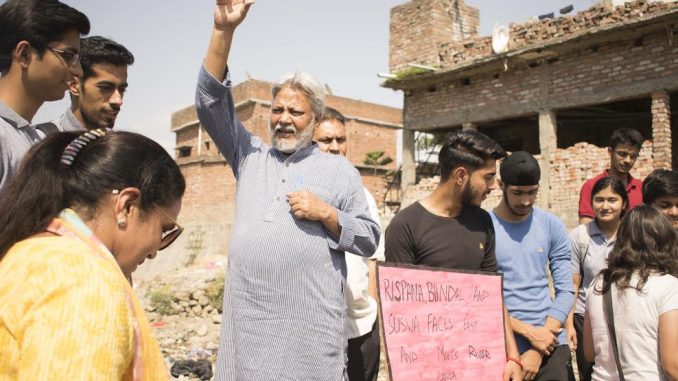
By Jamnalal Bajaj Foundation
Rajendra Singh and his organization, the Tarun Bharat Sangh, have dedicated themselves totally to rural development with environment care and protection for the last 21 years.
During his student days in the seventies, Rajendra Singh was associated with the ‘Sampuma Kranti’ movement – led by ‘Lok Nayak’ Jayaprakash Narayan. After finishing his studies, Rajendra Singh joined as a National Service Volunteer at Jaipur under the Ministry of Education, Government of India.
In 1984, he left his job and dedicated himself to rural development. He formed the Tarun Bharat Sangh (TBS) and, together with four of his companions, began organizing villagers for the repair and deepening of old johads (rainwater storage tanks).
When he first arrived in Alwar in 1985, he found that its forests had been decimated and its watershed damaged by miners and loggers – resulting in dangerous floods in the area during monsoons.

Inspired by Gandhiji’s teaching regarding local autonomy and self-reliance, Rajendra Singh introduced community-led institutions, that is, Gram Sabhas, Mahila Banks, River Parliament etc. in each village and initiated an awareness campaign for Gram Swavalamban in hundreds of villages.
To fulfil the needs of the villagers, Rajendra Singh started rural development and employment generation activities in 1985 in Gopalpura village through water conservation. He played a catalysing role in the building of 8600 johads in 1058 villages spread over 6500 sq km in nine districts of Rajasthan.
As a result of these efforts, five seasonal rivers in northeastern Rajasthan, which had nearly dried up, have become perennial.
He also successfully organised a three-month-long satyagraha to persuade the government to disallow fishing to protect fish and other riverine life forms.

In 1995, Rajendra Singh led a ‘Nadi Pahar Bachao Yatra’ from Galta in Jaipur to Gangotri in Uttarkashi to preserve the sanctity and purity of rivers and the green cover of the mountains. He also initiated the ‘Jal Bachao Johad Banao’ campaign in 1996.
In December 2002, he organized a Rashtriya Jal Yatra from Gandhi Samadhi, Rajghat, New Delhi, and covered 30 States in India including 144 river basins. Five national water conferences were organized during this yatra in different parts of the country. The Rashtriya Jal Yatra was an attempt to share water-related concerns among the citizens of India. The yatra stressed the fact that we should strive for linking people to rivers rather than interlinking rivers.
The experience of the yatra has now led to the formation of the Tarun Jal Vidyapeeth.
To motivate the village community to regenerate and protect forests in and around the Sariska National Park, Forest Protection Committees under Rajendra Singh’s leadership were set up in 90 villages, and another 32 committees have been set up in three other districts in Rajasthan.
A people’s sanctuary, Bhairondev Lok-Vanyajeev Abhayarany, spread over 12 sq. km. has been set up by the community in Bhanvta-Kolyala villages in Alwar.
The area, which was utterly barren 12 years ago, has now good forest cover and wildlife.

Rajendra Singh also led a campaign against the destructive consequences of mining in the Aravalli hills – which finally resulted in the issue of a ban by the Union Government, on the basis of a Supreme Court decision. As a result, about one thousand mines were closed by the Rajasthan Government, 470 of which were in and around Sariska. The workers rendered jobless were rehabilitated through water and forest conservation activities and rural development through different types of employment generation activities initiated by the Tarun Bharat Sangh.
Rajendra Singh and his organization, the Tarun Bharat Sangh, have dedicated themselves totally to rural development with environment care and protection for the last 21 years.

His efforts have turned arid land cultivable and large densely afforested tracts into wildlife sanctuaries by water management and made dry rivers flow throughout the year.
A true game changer.


Leave a Reply